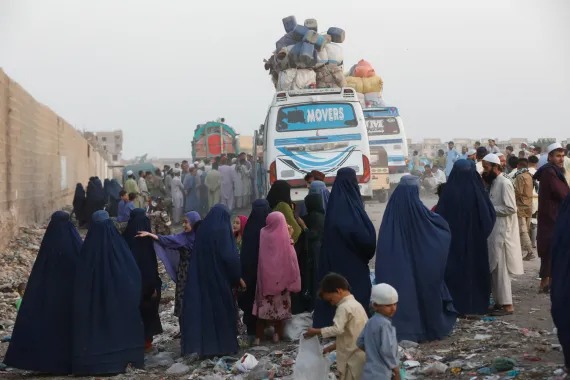As the clock ticks down on Pakistan’s government-imposed deadline for “illegal” refugees and migrants to leave the country, thousands of Afghan refugees find themselves in a race against time to return home. The October 31 deadline, initiated by Pakistan’s interim interior minister, Sarfaraz Bugti, has raised concerns among human rights organizations and the United Nations, who have criticized the move for putting vulnerable populations at risk.
Mass Exodus from Pakistan
Thousands of Afghan refugees and migrants residing in Pakistan are making their way to the border, fearing the consequences of missing the government’s deportation deadline. Over the last four decades, Afghanistan has been a refuge for countless Afghan nationals, who fled their homeland in the wake of the Soviet invasion of the 1980s and, more recently, after the Taliban’s resurgence in 2021. With the Afghan Taliban back in power, Pakistani officials estimate that between 600,000 to 800,000 Afghans have migrated to Pakistan, with nearly 1.7 million of them considered undocumented.
Voluntary Repatriation and Deportation Centers
In response to the looming deadline, local media reports revealed that nearly 100,000 Afghan immigrants have voluntarily returned to Afghanistan through the Torkham border crossing in Khyber Pakhtunkhwa and the Chaman crossing in Balochistan this month. While the Pakistani government maintains that the deportation drive is not targeted solely at Afghans, the establishment of deportation centers in all four provinces suggests otherwise. These centers are intended to detain foreigners until their repatriation, causing significant concern among rights groups and the United Nations.
A Life in Limbo
The impending deportation has left many Afghan refugees in Pakistan living in a state of uncertainty and fear. Adeela Akhtar, a 47-year-old widow and mother of two, who was once a schoolteacher in Kabul, is among those uncertain about their future. She moved to Pakistan 18 months ago due to security concerns in Afghanistan but has been unable to secure the necessary documentation. Her plea echoes the concerns of many others who have built homes, families, and livelihoods in Pakistan, and now face the prospect of returning to a war-torn country with uncertain security, limited economic opportunities, and restricted access to essential services.
Amidst the growing backlash from human rights organizations, Asad Khan, an Islamabad-based lawyer, criticized the government’s actions, stating that sending back Afghans who have lived in Pakistan for years or even decades violates their fundamental rights. He pointed out that international laws, ratified by Pakistan, deem such deportations illegal and emphasized the need for policies that prioritize the well-being and safety of these vulnerable populations.
In a statement, Human Rights Watch strongly condemned Pakistan’s decision, citing threats, abuse, and detention to coerce Afghan asylum seekers without legal status into returning to Afghanistan or facing deportation. Fereshta Abbasi, the Afghanistan researcher at HRW, expressed deep concern for the safety and well-being of Afghans returning to a country still marred by danger, emphasizing the significant security risks they face, including threats to their lives.
As the deportation deadline draws near, Afghan refugees in Pakistan continue to grapple with an uncertain future and the growing anxiety over what awaits them on the other side of the border. The international community closely watches this unfolding crisis, hoping for a solution that balances Pakistan’s security concerns with the fundamental rights and well-being of these vulnerable populations.















